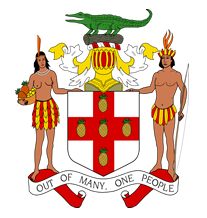The island - discovered by Christopher COLUMBUS in 1494 - was settled by the Spanish early in the 16th century. The native Taino, who had inhabited Jamaica for centuries, were gradually exterminated and replaced by African slaves. England seized the island in 1655 and established a plantation economy based on sugar, cocoa, and coffee. The abolition of slavery in 1834 freed a quarter million slaves, many of whom became small farmers. Jamaica gradually increased its independence from Britain. In 1958 it joined other British Caribbean colonies in forming the Federation of the West Indies. Jamaica gained full independence when it withdrew from the Federation in 1962. Deteriorating economic conditions during the 1970s led to recurrent violence as rival gangs affiliated with the major political parties evolved into powerful organized crime networks involved in international drug smuggling and money laundering. Violent crime, drug trafficking, and poverty pose significant challenges to the government today. Nonetheless, many rural and resort areas remain relatively safe and contribute substantially to the economy.
Jamaica is a parliamentary democracy under a constitutional monarchy and part of the Commonwealth realm.
Members:
Resources
Displaying 6 - 10 of 77Town and Country Planning (Portland Parish) Provisional Development Order, 2013 (Confirmation) Notification, 2015 (No. 56B of 2015).
This Order, made under section 7 of the Town and Country Planning Act, confirms and amends the Town and Country Planning (Portland Parish) Provisional Development Order, 2013. Minor amendments are made to provisions concerning, among other things, the Environmental Action Program, the Agricultural Land Use Classification System and the protection of agricultural lands.
Amends: Town and Country Planning (Portland Parish) Provisional Development Order, 2013 (No. 89C of 2013). (2013-06-21)
Town and Country Planning (Negril and Green Island Area) Provisional Development Order, 2013 (Confirmation) Notification, 2015 (No. 56A of 2015).
This Order, made under section 7 of the Town and Country Planning Act, confirms and amends the Town and Country Planning (Negril and Green Island Area) Provisional Development Order, 2013. Minor amendments are made to provisions concerning, among other things, the meaning of "development".
Amends: Town and Country Planning (Negril and Green Island Area) Provisional Development Order, 2013 (No. 56F of 2013). (2013-03-21)
Natural Resources (Prescribed Areas) (Prohibition of Categories of Enterprise, Construction and Development) (Amendment) Order, 2015 (No. 51A of 2015).
This Order amends the Natural Resources (Prescribed Areas) (Prohibition of Categories of Enterprise, Construction and Development) Order, 1996 to provide for transitional arrangements with respect to a permit for an undertaking any category of enterprise, construction or development to which the requirement for a permit did not apply before 1 April 2015 and to modify the list of enterprise, construction or development to which the principal Order applies.
Natural Resources Conservation (Permits and Licences) (Amendment) Regulations 2015 (G.N. 51C of 2015).
These Regulations amend the Natural Resources Conservation (Permits and Licences) Regulations 1996 by replacing regulation 3 relating to a grant of a permit to undertake an enterprise, construction or development of a prescribed description or category and by inserting new regulations (7A-D) on the grant of a renewal of a permit. Amendment are also made to the Fist Schedule (Forms) and regulation 24 and Schedule 2 (fees).
Amends: Natural Resources Conservation (Permits and Licences) Regulations 1996. (2000)
Town and Country Planning (Trelawny Parish) Provisional Development Order, 2013 (No. 89B of 2013).
This Order, made under section 5 of the Town and Country Planning Act, provides for a wide variety of matters regarding the administration and development of the Trelawny Parish Development Area. Matters regulated by this Order include planning permission for development, control on subdivision of land, consultation with national authorities by the local planning authority before granting planning permission, appeals. The Second Schedule sets out Use Classes. The Third Schedule sets out Permitted Development. The Fifth Schedule sets out the Planning Framework for the development area.


